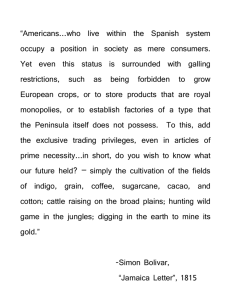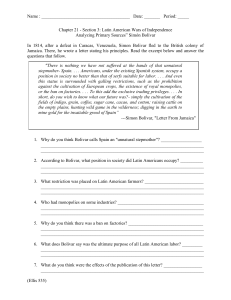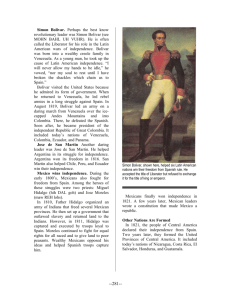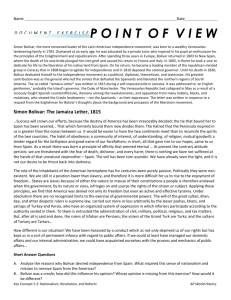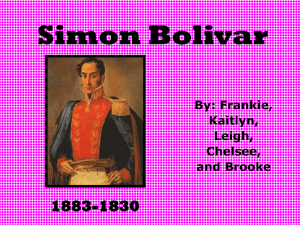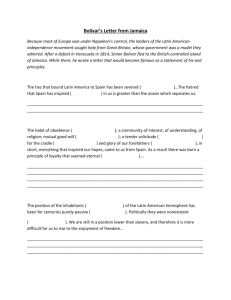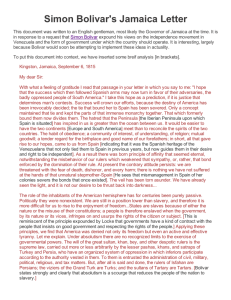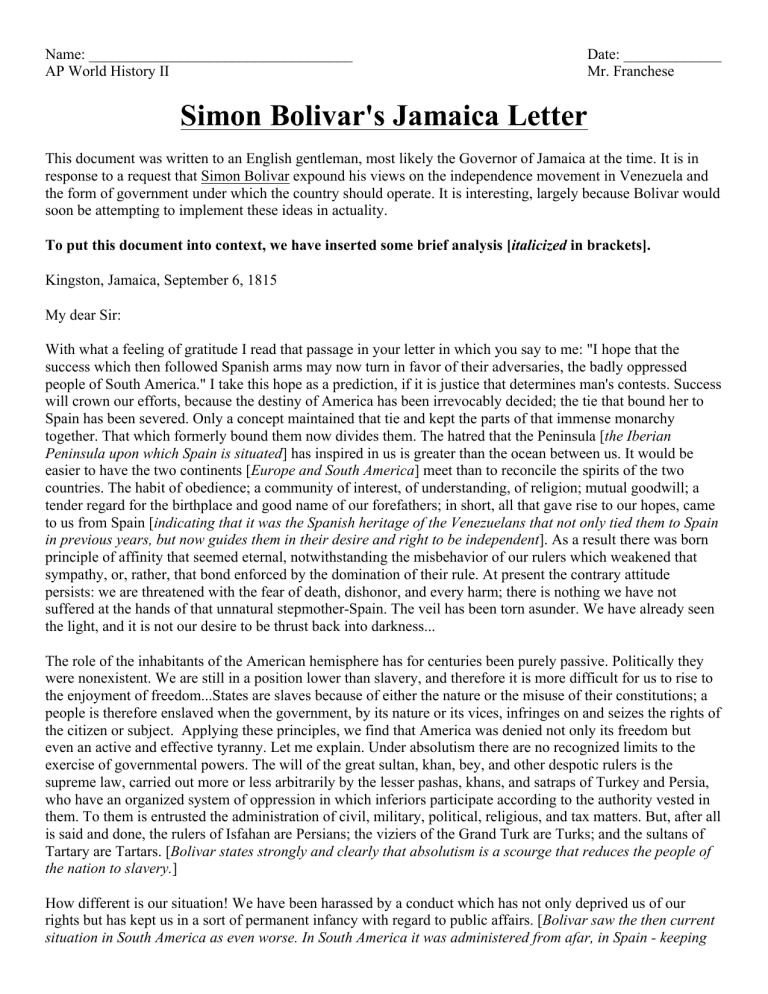
Name: ___________________________________ AP World History II Date: _____________ Mr. Franchese Simon Bolivar's Jamaica Letter This document was written to an English gentleman, most likely the Governor of Jamaica at the time. It is in response to a request that Simon Bolivar expound his views on the independence movement in Venezuela and the form of government under which the country should operate. It is interesting, largely because Bolivar would soon be attempting to implement these ideas in actuality. To put this document into context, we have inserted some brief analysis [italicized in brackets]. Kingston, Jamaica, September 6, 1815 My dear Sir: With what a feeling of gratitude I read that passage in your letter in which you say to me: "I hope that the success which then followed Spanish arms may now turn in favor of their adversaries, the badly oppressed people of South America." I take this hope as a prediction, if it is justice that determines man's contests. Success will crown our efforts, because the destiny of America has been irrevocably decided; the tie that bound her to Spain has been severed. Only a concept maintained that tie and kept the parts of that immense monarchy together. That which formerly bound them now divides them. The hatred that the Peninsula [the Iberian Peninsula upon which Spain is situated] has inspired in us is greater than the ocean between us. It would be easier to have the two continents [Europe and South America] meet than to reconcile the spirits of the two countries. The habit of obedience; a community of interest, of understanding, of religion; mutual goodwill; a tender regard for the birthplace and good name of our forefathers; in short, all that gave rise to our hopes, came to us from Spain [indicating that it was the Spanish heritage of the Venezuelans that not only tied them to Spain in previous years, but now guides them in their desire and right to be independent]. As a result there was born principle of affinity that seemed eternal, notwithstanding the misbehavior of our rulers which weakened that sympathy, or, rather, that bond enforced by the domination of their rule. At present the contrary attitude persists: we are threatened with the fear of death, dishonor, and every harm; there is nothing we have not suffered at the hands of that unnatural stepmother-Spain. The veil has been torn asunder. We have already seen the light, and it is not our desire to be thrust back into darkness... The role of the inhabitants of the American hemisphere has for centuries been purely passive. Politically they were nonexistent. We are still in a position lower than slavery, and therefore it is more difficult for us to rise to the enjoyment of freedom...States are slaves because of either the nature or the misuse of their constitutions; a people is therefore enslaved when the government, by its nature or its vices, infringes on and seizes the rights of the citizen or subject. Applying these principles, we find that America was denied not only its freedom but even an active and effective tyranny. Let me explain. Under absolutism there are no recognized limits to the exercise of governmental powers. The will of the great sultan, khan, bey, and other despotic rulers is the supreme law, carried out more or less arbitrarily by the lesser pashas, khans, and satraps of Turkey and Persia, who have an organized system of oppression in which inferiors participate according to the authority vested in them. To them is entrusted the administration of civil, military, political, religious, and tax matters. But, after all is said and done, the rulers of Isfahan are Persians; the viziers of the Grand Turk are Turks; and the sultans of Tartary are Tartars. [Bolivar states strongly and clearly that absolutism is a scourge that reduces the people of the nation to slavery.] How different is our situation! We have been harassed by a conduct which has not only deprived us of our rights but has kept us in a sort of permanent infancy with regard to public affairs. [Bolivar saw the then current situation in South America as even worse. In South America it was administered from afar, in Spain - keeping the people of the Spanish colonies from developing.] If we could at least have managed our domestic affairs and our internal administration, we could have acquainted ourselves with the processes and mechanics of public affairs. We should also have enjoyed a personal consideration, thereby commanding a certain unconscious respect from the people, which is so necessary to preserve amidst revolutions. That is why I say we have even been deprived of an active tyranny, since we have not been permitted to exercise its functions. Americans today and perhaps to a greater extent than ever before, who live within the Spanish system occupy a position in society no better than that of serfs destined for labor, or at best they have no more status than that of mere consumers. Yet even this status is surrounded with galling restrictions, such as being forbidden to grow European crops, or to store products which are royal monopolies, or to establish factories of a type the Peninsula itself does not possess. To this add the exclusive trading privileges, even in articles of prime necessity, and the barriers between American provinces, designed to prevent all exchange of trade, traffic, and understanding. In short, do you wish to know what our future held?--simply the cultivation of the fields of indigo, grain, coffee, sugar cane, cacao, and cotton; cattle raising on the broad plains; hunting wild game in the jungles; digging in the earth to mine its gold--but even these limitations could never satisfy the greed of Spain. So negative was our existence that I can find nothing comparable in any other civilized society, examine as I may the entire history of time and the politics of all nations. Is it not an outrage and a violation of human rights to expect a land so splendidly endowed, so vast, rich, and populous, to remain merely passive? As I have just explained, we were cut off and, as it were, removed from the world in relation to the science of government and administration of the state. We were never viceroys or governors, save in the rarest of instances; seldom archbishops and bishops; diplomats never; as military men, only subordinates; as nobles, without royal privileges. In brief, we were neither magistrates nor financiers and seldom merchants--all in flagrant contradiction to our institutions. It is harder, Montesquieu has written, to release a nation from servitude than to enslave a free nation. This truth is proven by the annals of all times, which reveal that most free nations have been put under the yoke, but very few enslaved nations have recovered their liberty. Despite the convictions of history, South Americans have made efforts to obtain liberal, even perfect, institutions, doubtless out of that instinct to aspire to the greatest possible happiness, which, common to all men, is bound to follow in civil societies founded on the principles of justice, liberty, and equality. But are we capable of maintaining in proper balance the difficult charge of a republic? Is it conceivable that a newly emancipated people can soar to the heights of liberty, and, unlike Icarus, neither have its wings melt nor fall into an abyss? Such a marvel is inconceivable and without precedent. There is no reasonable probability to bolster our hopes. More than anyone, I desire to see America fashioned into the greatest nation in the world, greatest not so much by virtue of her area and wealth as by her freedom and glory. Although I seek perfection for the government of my country, I cannot persuade myself that the New World can, at the moment, be organized as a great republic. Since it is impossible, I dare not desire it; yet much less do I desire to have all America a monarchy because this plan is not only impracticable but also impossible. Wrongs now existing could not be righted, and our emancipation would be fruitless. The American states need the care of paternal governments to heal the sores and wounds of despotism and war . . . [He sees paternal government, read "dictatorship", as a temporary expedient to develop South America and prepare it for freedom in the future.] From the foregoing, we can draw these conclusions: The American provinces are fighting for their freedom, and they will ultimately succeed. Some provinces as a matter of course will form federal and some central republics; the larger areas will inevitably establish monarchies, some of which will fare so badly that they will disintegrate in either present or future revolutions. To consolidate a great monarchy will be no easy task, but it will be utterly impossible to consolidate a great republic. [This comment was prescient, but only to a degree. Even though no monarchies developed; a kind of centrifugal force spun many states from the area Bolivar eventually liberated - Venezuela, Columbia, Panama, Bolivia, Ecuador, and Peru.] When success is not assured, when the state is weak, and when results are distantly seen, all men hesitate; opinion is divided, passions rage, and the enemy fans these passions in order to win an easy victory because of them. As soon as we are strong and under the guidance of a liberal nation which will lend us her protection, we will achieve accord in cultivating the virtues and talents that lead to glory. Then will we march majestically toward that great prosperity for which South America is destined. I am, Sir, etc., etc. SIMON BOLIVAR It must be remembered that at this stage of his career that Bolivar was in some dispair over his exile. He had made several attempts to liberated Venezuela and Columbia, and had been thwarted each time, not only by Spain, but by elements within the colonies themselves. He longs for free republican government and a free economy, but sees this as impractical in the short term, at least until the people are taught to use and to honor the vital institutions that govern society. 1. Who is the audience of this document? 2. What is Bolívar’s major argument about the need for the people in Spanish Latin America to gain their independence? 3. How has Spain economically restricted the American colonies? 4. What is the purpose of Simon Bolivar writing this letter? What is Simon Bolivar’s point of view on the topic as he wrote this letter? 5. How is Bolívar’s Jamaica Letter similar to the American Declaration of Independence?
